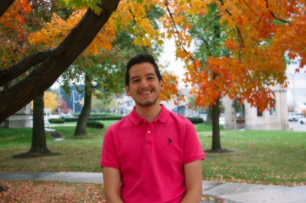Reyna: The importance of increasing young voter turnout
March 29, 2020
We’re living in interesting and confusing times. Case Western Reserve University switched to online remote classes and students are trying to adjust and combat the current COVID-19 pandemic by limiting face-to-face interactions. While all of the university matters are currently in our minds and the virus has taken over the news, we should remind ourselves of another important matter in our hands, the general election this coming November.
I know what some of you all are thinking. We should set political stuff aside and focus on the pandemic. Politics can wait.
While that is somewhat true, we can’t isolate ourselves from other matters the same way we’re isolating ourselves from people and crowded areas. It is important to be aware of other things in life, and it can be a nice break from the chaos that follows this pandemic. Additionally, this crisis will surely bring out the authenticity of politicians as we try to protect ourselves and others from catching the virus. What better way to determine who should be representing us?
We currently have two front-runners in the race to become the Democratic Party’s presidential nominee: former Vice President Joe Biden and Sen. Bernie Sanders. The candidates provide different ideologies.
Biden is more moderate and has the support of former Rep. Beto O’Rourke, Sen. Amy Klobuchar, and former Mayor Pete Buttigieg. This gives the former vice president solid footing to unite moderates and win the nomination.
Sanders is more progressive. He wants to change Washington for the better, and proposes big changes to our infrastructure to do so. Sanders provides a platform for those who are tired of the norm. Many young voters support the senator from Vermont, while older voters tend to prefer the former vice president.
Whoever you support, it’s important that you get out and vote. Voter turnout for young people is very low compared to other ages. In fact, it has always been the lowest. Our age group—18-29 year olds—peaked in 2008 with a 48.4% turnout. That same year, those above 60 years old had a turnout of 71%. In 2016, young voter turnout dropped to 43.4%.
These numbers are too low. We need to do better if we really want to see a change in our country. Every vote counts, and the voice of our generation—the leaders of the future—must be especially heard. Our concerns and grievances will remain unaddressed if we stay silent and away from the voting booths. The decisions made by politicians affect us. If their decisions only favor older generations, then we are at fault for failing to exercise our right to vote.
Imagine how different this country could be if you voted. All the stuff you’re tired of—not having enough support for student loan forgiveness or making college affordable, for instance—have a higher chance of being noticed if you exercise your right to vote.
If you’re upset that Biden is in the lead, get out and vote instead of screaming into the air. If you want Sanders’ revolution to be a reality, convince others to follow your lead and head to the booths.
If you’re a Biden supporter, do the same to guarantee that your candidate wins the nomination.
It’s okay to post your grievances on social media and get some traction that way, but it will amount to little if you don’t vote. You may sway some people and incite some change, but make sure to do your part as well by going to the voting booth when the time comes.
Our current situation has displaced CWRU students all across the world. I know there are students registered to vote in Ohio now back in their home state. If you are unsure if you’ll be back by the election, request an absentee ballot. Don’t let being displaced affect your right to vote. Use your voice even in the toughest of times.
I know I may sound like a broken record, but it truly is important to vote. It’s important to make a habit early on of voting in every election cycle. We’re all in uncharted waters as both professors and students try to figure out how to continue education as best as possible. Amidst these challenging times, I hope we remember that there are other matters happening around us that need our attention.
Christian Reyna is a second-year biomedical engineering major who plans to obtain a Spanish minor. When he’s not writing, he is trying to figure out how Zoom works and contemplating the effects of pandemics on his favorite coffee imports.



